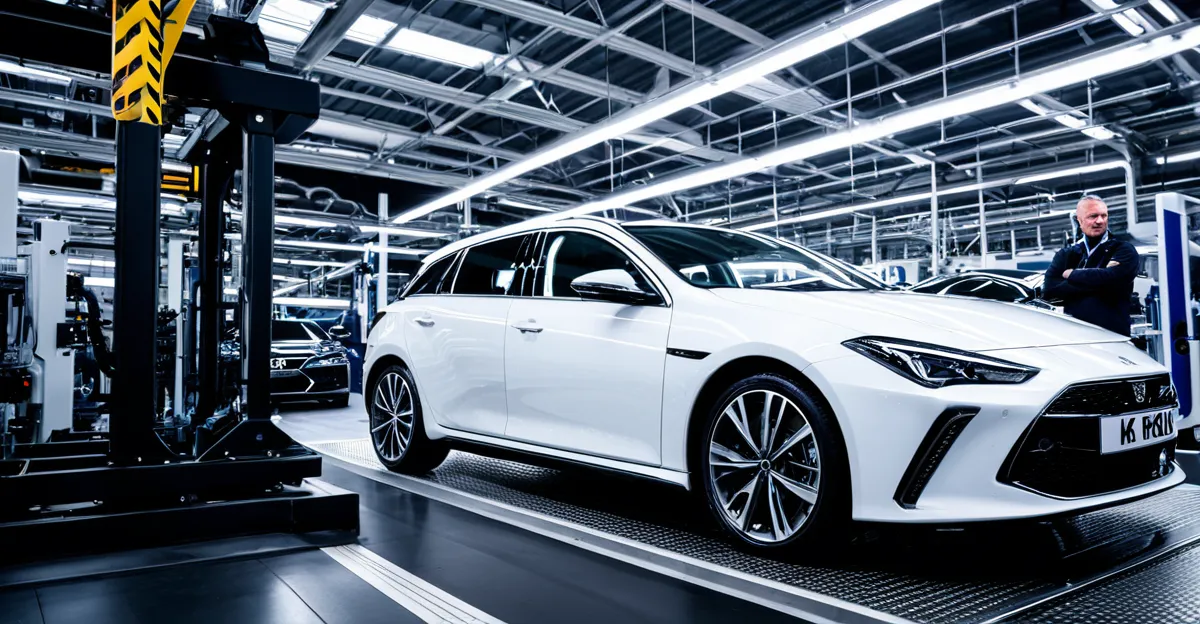Recent Technological Advancements in UK Automotive Manufacturing
The UK automotive sector has embraced Industry 4.0 automotive principles, driving significant transformation through cutting-edge innovation. Automation and robotics have revolutionized production lines, delivering higher precision and efficiency. For example, robotic arms now perform complex welding and assembly tasks faster than manual labor, minimizing errors and accelerating output.
Artificial intelligence (AI) plays a pivotal role in optimising workflows. By analysing real-time data, AI systems predict maintenance needs, adjust production speed, and reduce downtime. This integration enhances flexibility, allowing factories to swiftly adapt to changing demands. AI’s influence extends beyond operations, also improving quality control by detecting defects early.
This might interest you : How are UK automakers addressing the global semiconductor shortage?
Digitalization and smart manufacturing underpin this technological surge. Connected devices and IoT-enabled sensors facilitate seamless communication across machinery, fostering data-driven decisions. This transparency boosts traceability and streamlines supply chain management, crucial for meeting regulatory standards and consumer expectations.
Collectively, these advancements reflect the UK’s commitment to automotive manufacturing innovation UK, positioning the industry at the forefront of global competitiveness through smarter, faster, and more sustainable production methods.
Have you seen this : What are the latest trends in UK car manufacturing?
Sustainable Practices Shaping the Industry
Sustainable automotive manufacturing has become a cornerstone of green manufacturing UK, driven by urgent carbon reduction techniques. UK manufacturers increasingly adopt energy-efficient technologies such as variable-speed drives and LED lighting to minimize power consumption on production lines. Additionally, the integration of renewable energy sources like solar and wind significantly lowers factories’ carbon footprints.
Another vital development is the embrace of circular economy principles, focusing on waste reduction and resource reutilization. This approach encourages manufacturers to design products with end-of-life recycling in mind, cutting down landfill waste and reducing raw material extraction.
Examples of sustainable materials include bio-based plastics and recycled metals, which replace traditional counterparts without compromising quality. Eco-friendly production methods also prioritize water conservation and minimising harmful emissions. Together, these practices underscore the UK’s commitment to environmentally responsible automotive manufacturing innovation UK, helping align the industry with stricter environmental regulations and evolving consumer expectations. This shift not only benefits the planet but enhances brand reputation and future-proofs manufacturing competitiveness.
Lightweight Materials and Their Impact
Lightweight automotive materials, including advanced composites and high-strength alloys, are revolutionizing vehicle weight reduction UK-wide. These materials provide a crucial balance of strength and durability while significantly lowering mass. The primary benefit of adopting such lightweight automotive materials is enhanced fuel efficiency, which directly supports carbon reduction efforts and regulatory compliance.
UK manufacturers invest heavily in these advanced composites, such as carbon fiber-reinforced polymers, which offer superior weight-saving over traditional steel. High-strength aluminum alloys are also increasingly utilized due to their corrosion resistance and recyclability. Together, these materials help reduce vehicle weight without compromising safety or performance.
Vehicle weight reduction UK initiatives aim to improve acceleration, handling, and overall efficiency. For example, lighter chassis and body panels reduce energy consumption, contributing to lower emissions. Additionally, lightweight materials extend battery range in electric vehicles by shedding unnecessary mass.
By embracing lightweight automotive materials, UK manufacturers push the boundaries of automotive manufacturing innovation UK, reinforcing sustainability while maintaining industry competitiveness. This trend aligns with broader Industry 4.0 automotive goals, where material science innovation complements digital and AI-driven production enhancements.
Digital Transformation and Data-Driven Manufacturing
Digitalization in the automotive industry is reshaping production with smart factories UK at the forefront. These factories integrate IoT devices across machinery, creating a connected ecosystem where real-time data flows seamlessly. This connectivity enables advanced data analytics automotive manufacturing, driving smarter decisions on the factory floor.
Big data plays a critical role by gathering vast amounts of operational information. Using predictive analytics, manufacturers anticipate equipment failures, significantly reducing downtime. This proactive approach not only improves efficiency but also elevates product quality by catching defects early in the process.
Enhanced traceability is another benefit, with smart factories UK ensuring transparent supply chain monitoring. This visibility helps address regulatory demands and consumer calls for ethical sourcing and accountability. For instance, every part’s journey can be tracked digitally, enabling rapid response to issues.
Together, digitalization automotive industry efforts optimize workflows and foster a responsive manufacturing environment. The combination of connectivity and data-driven insights solidifies the UK’s leadership in automotive manufacturing innovation UK, aligning with Industry 4.0 automotive principles and setting a benchmark for global excellence.
Leading UK Innovators and Case Studies
Delving into UK automotive company innovations reveals pioneering efforts propelling the sector forward. Major manufacturers have integrated automotive manufacturing innovation UK by adopting Industry 4.0 automotive technologies such as advanced robotics and AI-assisted production. These initiatives enable faster cycle times and improved product consistency, illustrating how innovation translates into practical benefits.
Emerging startups also contribute significantly. By focusing on niche applications like electric vehicle components or sustainable materials, these companies infuse fresh ideas into traditional processes. Their adaptability fosters rapid implementation of cutting-edge solutions, often providing agile responses to market demands.
Examining automotive manufacturing case studies UK highlights how real-world applications of technology transform operations. For instance, one firm’s investment in smart sensors led to a 20% reduction in downtime, underlining the value of data-driven manufacturing approaches. Another case demonstrated how robotic automation streamlined assembly lines, boosting output without compromising quality.
Together, these examples emphasize the tangible impacts of innovation on UK production efficiency and workforce dynamics. By learning from such successes, the industry continues to refine manufacturing paradigms, maintaining its competitive edge within the global automotive landscape.







